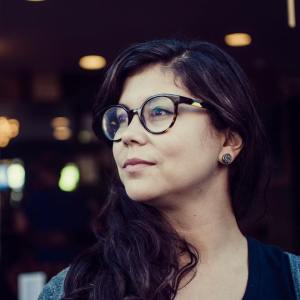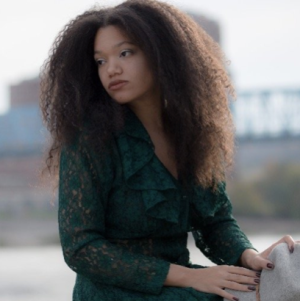Interviewed by Kyla Jamieson
Adèle Barclay published her début collection of poetry, If I Were in a Cage I’d Reach Out for You, to widespread acclaim in the fall of 2016. A poem from this collection, written—like many of Barclay’s poems—for one of her close friends, won the 2016 Walrus Reader’s Choice Award for poetry. Accepting the award, Barclay wrote, “That a poem predicated on friendship and survival managed to charm enough people to win the Readers’ Choice Award is inspiring to me—it feels right considering the nature of our love and politics.”
An early version of the manuscript that became If I Were in a Cage I’d Reach Out for You was shortlisted for the Robert Kroetsch Award for Innovative Poetry in 2015; this recognition helped Barclay land a contract with her collection’s publisher, Nightwood Editions. In 2016, Barclay won the Lit POP Award for Poetry—her prize included publication and a trip to Montreal for the POP Montreal International Music Festival because, as Barclay put it, “they know if they give writers money they’ll just spend it on rent.” Not long after our interview, it was announced that If I Were in a Cage I’d Reach Out for You was a finalist for the Dorothy Livesay Poetry Prize, a BC Book Prize that acknowledges the author of the year’s best poetry collection.
We spoke in Barclay’s kitchen, where she’d generously assembled a spread of cheeses, crackers, and nougat sourced from shops in her Commercial Drive neighbourhood. We discussed her education and influences, the ambient intimacy of texting, and not being an asshole. After our conversation, Barclay offered to read my tarot from a nautically themed deck, with her laptop open to assist. I emerged from the experience and into Vancouver’s uncharacteristic snow feeling much as I do when I surface from reading Barclay’s poems—hopeful and affirmed, a little less alone amidst the complexities and contradictions of contemporary existence.
Let’s start with your education. Having recently received your PhD in English, you’ve reached the height of academic achievement. It seems like the MFA is a more common route for poets to take, at least in Canada. Why did you choose the path you pursued?
It’s sort of just how it worked out. I actually started in Science at Queen’s then migrated to English. I did my Master’s at McGill, where I was definitely more on the periphery of the creative writing scene but went to a lot of events, took in a lot, and made friends with people like my friend Klara Du Plessis—we were both Master’s students and now we’re poets in the world. Then for some reason I decided to do a PhD. I graduated during the recession, so at the time academia was the most lucrative direction to go in. I took a chance on BC—I came out here to study at UVic and during the beginning of my PhD my writing took a huge dip. I was deeply uninspired. Everything I wrote, I was like, “This is awful.”
[Read more…]


